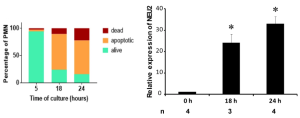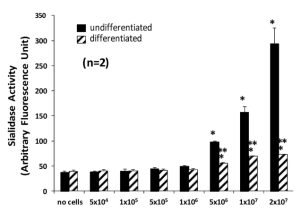A group from Baltimore Veterans Affairs Medical Center, Research Service, Baltimore, MD, USA, etc. has reported about altered sialidase expression in human myeloid cells undergoing apoptosis and differentiation.
https://www.nature.com/articles/s41598-022-18448-6
The sialidase/neuraminidase (NEU) activity and expression in mature human neutrophil (PMN)s and the HL60 promyelocytic leukemic cell line were studied, and changes in sialic acid modification that would occur in PMNs undergoing apoptosis and HL60 cells during their differentiation into PMN-like cells were observed.
PMNs are part of the first line of host defenses against invasive prokaryotic pathogens4. Myeloid progenitors undergo maturation within the bone marrow into mature PMNs. PMNs undergo profound shape changes permitting these cells to squeeze through the small caliber microvasculature and interendothelial cell junctions to enter extravascular tissues, where they adhere to and engulf bacteria for successful phagocytosis and intracellular killing. The HL60 promyelocytic leukemia cell line has been used as a model for myelopoiesis.
In proapoptotic PMNs, NEU2 protein expression increased >30.0-fold as shown below.

The total NEU activity in differentiated HL60 (dHL60) cells was dramatically reduced compared to that of nondifferentiated cells as shown below.

Thus, changes in PMN surface sialylation could regulate accessibility of both Siglecs and Galectins.
